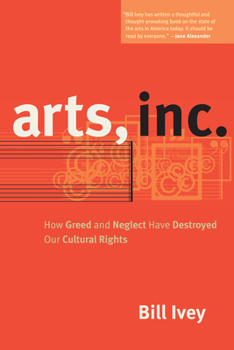Arts, Inc.: How Greed and Neglect Have Destroyed Our Cultural Rights
Select Format
Select Condition 
Book Overview
In this impassioned and persuasive book, Bill Ivey, the former chairman of the National Endowment for the Arts, assesses the current state of the arts in America and finds cause for alarm. Even as he celebrates our ever-emerging culture and the way it enriches our lives here at home while spreading the dream of democracy around the world, he points to a looming crisis. The expanding footprint of copyright, an unconstrained arts industry marketplace,...
Format:Paperback
Language:English
ISBN:0520267923
ISBN13:9780520267923
Release Date:November 2010
Publisher:University of California Press
Length:368 Pages
Weight:1.40 lbs.
Dimensions:0.9" x 5.8" x 8.7"
Customer Reviews
3 ratings
Very informative and thought provoking
Published by Thriftbooks.com User , 16 years ago
Bill Ivey covers an enormous amount of arts terrain in this thought provoking book. Anyone involved with the arts rarely considers all the facets of the arts and the way in which they intertwine. Ivey, from his unique perspective as former NEA Chairman, is in the position to inform and to a slightly lesser degree offer solutions to some of the larger problems to how greed and neglect have destroyed our cultural rights. As a music educator, I found his assessment of the historical hierarchical structure of music valuing on target, but felt he could have acknowledged the more recent progress in multicultural music education. The National Association for Music Education developed national standards in the 1990's that have largely been adopted by the states. As written, these national standards have proven to be a vehicle to promote all types of established cultural traditions in music. The correct argument he makes in Arts, Inc. that music education is about "band and choir", is a practice that is slowly changing.
Arts in America
Published by Thriftbooks.com User , 16 years ago
Arts, Inc. is a very good book and probably the only one out there that explores the position of the arts--fine, popular, folk, commercial, and non-profit--in the United States. Whether one agrees with Bill Ivey's framing of the American arts scene in terms of "rights" or not, the book raises a set of issues that need to be discussed by citizens as well as members of government (who never seem to engage the arts seriously except when it comes to playing football with the NEA). Each right really focuses on a separate issue, and while there is inevitably some overlap between them, the book is not one idea endlessly repeated. The book reads extremely well and is filled with a good number of compelling examples of why the arts are in peril in the United States today. What is perhaps fundamental in Ivey's take on the arts is that they have a great potential to enhance the quality of life of ordinary Americans--both as art producers and consumers--and this potential is squandered because the arts have been totally left to market forces without any consideration of their relevance to the well being of the nation and its citizenry.
A whole new arena of public policy, defined
Published by Thriftbooks.com User , 16 years ago
It's amazing that we've made it all the way into the 21st century without anyone attempting to write about the condition of the entire U.S. arts system and how it connects - or doesn't connect - with the public interest. But Bill Ivey has done it in Arts, Inc., a comprehensive and very readable look at how market forces and an inattentive government have allowed our culture to drift away from public purposes. Ivey is convinced that we can enhance quality of life for all Americans if we assert his six "cultural rights," and I tend to agree. Although I wish the author had spent more time on specific art forms like theater and the art gallery scene, Arts, Inc. includes plenty of eye-popping examples of how we've got things wrong. The book defines a whole new arena for public policy and goes beyond complaining about what we haven't done with art and art making to paint a picture of how a vibrant cultural life can give the U.S. a high quality of life in the coming post-consumerist age.





